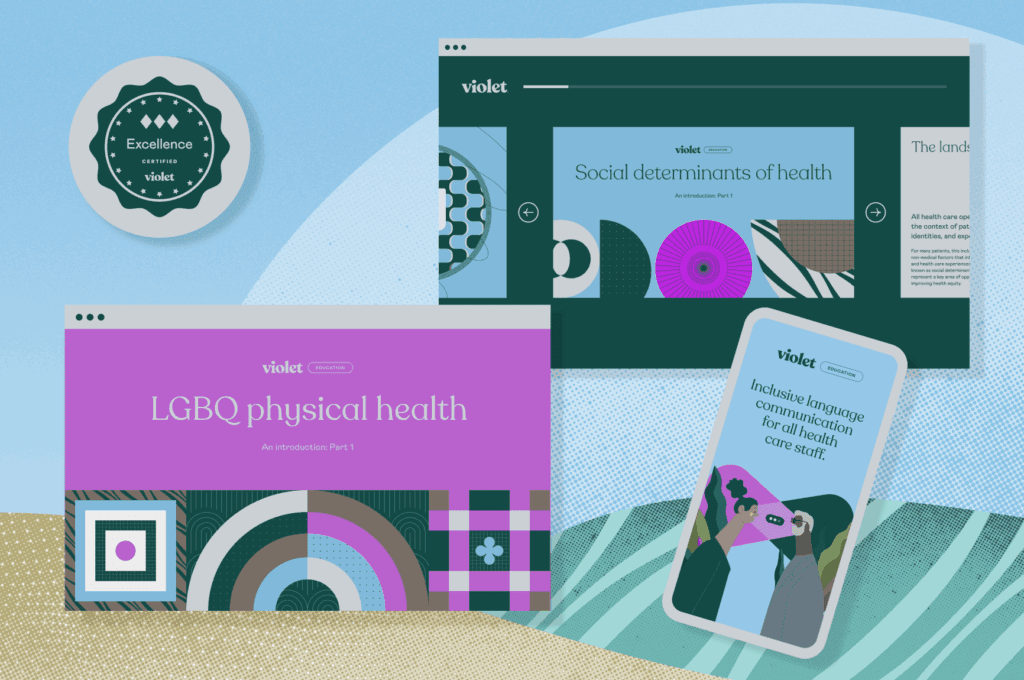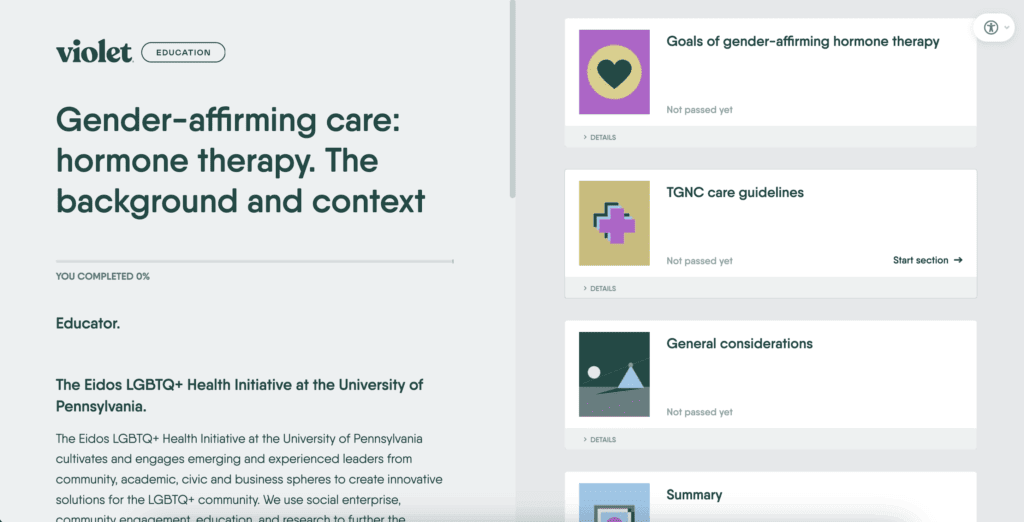Violet: Cultural Competency Upskilling
Why Cultural Competency Matters
In a healthcare landscape often marked by rushed, impersonal encounters that leave patients feeling underserved, it’s clear we must shift our approach towards a more holistic model of care. This need is magnified within minority communities, where the risk of encountering discrimination and healthcare providers unequipped to address their unique needs is heightened. Mounting evidence reveals the inadequacy of one-size-fits-all methodologies in achieving optimal patient outcomes. Embracing the concept of treating patients as whole people with individualized healthcare needs is not just an alternative—it’s a necessity.

The Client
As part of our work to increase access to affirming, competent care for LGBTQ+ patients, Eidos partnered with Violet, a start-up bringing cultural competency training for medical providers to scale.
Eidos reviewed and analyzed data from a recent study investigating Violet’s impact on 100+ clinicians at a behavioral health organization serving culturally diverse clients. The study found that providers who achieved one of Violet’s competency benchmarks had better outcomes than those who did not, including 18% better patient matches with clinicians, 13% higher session adherence, and 11% higher overall patient retention rate.
The Work: LGBTQ+ Health Courses
Recognizing the deep impact of Violet’s benchmarking approach, Eidos has continued working with Violet to address critical gaps in provider knowledge of LGBTQ+ health. Despite clear evidence that the LGBTQ+ community experiences unique and heightened health disparities, there is still a profound lack of LGBTQ+ cultural competency training for students and providers. This deficit perpetuates unaffirming and potentially harmful care, leading to medical mistrust, avoidance of healthcare services, and exacerbating health disparities within this vulnerable population [Read our Primer on LGBTQ+ Health Disparities for more].
Eidos developed education on four priority LGBTQ+ health topics:
- Gender Affirming Hormone Therapy 101
- How-to Guide for Mental Health Providers Writing Letters in Support of Gender Affirming Care
- Breast/Chest Cancer Screening for LGBTQ+ Populations
- Colorectal Cancer Screening for LGBTQ+ Populations
After an extensive review of available research and standards of care from sources including the American Cancer Society, World Professional Association for Transgender Health (WPATH) and the Endocrine Society, Eidos developed four comprehensive learning modules which Violet now uses to educate providers nationwide.

The Results
The response from providers who took the courses has been overwhelmingly positive. Since their launch in June of 2023,
- 1800+ providers completed the “Hormone Therapy 101” course
- 2200+ providers completed the “Writing Letters in Support of Gender-Affirming Care” course
and since their launch in September of 2024,
- 500+ providers completed the “Breast/Chest Cancer Screening” course, and
- 700+ providers completed the “Colorectal Cancer Screening” course.
All four courses have received positive ratings from learners, receiving 4.4 to 4.7 out of 5 points in course evaluations.
Impact on Health Equity
This early data is promising, demonstrating increasing demand for LGBTQ+ competent education as well as providers’ positive response to these trainings. Increasing LGBTQ+ competence for healthcare providers is essential to combatting disparities and advancing health equity. Culturally competent providers have the potential to profoundly impact the lives of LGBTQ+ individuals, fostering a healthcare environment that is more inclusive, supportive, and responsive to diverse needs.
“I truly believe that to meaningfully build health equity, we are going to need more innovation that’s developed with industry-leading partners like Eidos. In healthcare, innovation cannot happen in a vacuum. Partnering with the Eidos team is enabling Violet to innovate, research our impact on clinical impact, and iterate in a seamless manner.”
Gaurang Choksi, Founder & CEO, Violet